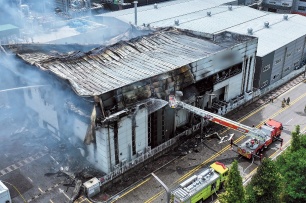
China Daily » Capital News
HWASEONG, South Korea, Jun 25 — Multiple powerful explosions set a lithium battery factory on fire in South Korea on Monday, killing 22 workers, most of them Chinese nationals, as it burned out of control for nearly six hours, fire officials said.
The blaze ripped through a factory run by primary battery manufacturer Aricell in Hwaseong, an industrial cluster southwest of the capital Seoul. It was eventually largely extinguished.
Local officials said 18 Chinese workers and one Laotian were among the dead. The nationality of the remaining deceased worker was not yet confirmed, fire official Kim Jin-young told reporters, citing information from company officials.
“Most of the bodies are badly burned, so it will take some time to identify each one,” Kim said, adding that one person was still missing.
The Chinese embassy in South Korea confirmed the deaths of Chinese nationals in a statement on Monday evening, but said it had yet to confirm the final death toll.
China’s Ambassador to South Korea Xing Haiming contacted the governor of Gyeonggi Province to arrange for the rescue and treatment of the Chinese people.
Xing will visit the site of the fire personally, it said.
The blaze began at 10:31 am after a series of battery cells exploded inside a warehouse with some 35,000 units, Kim said. What had triggered the explosion remains unclear, he added.
Initial investigations indicate that the fire spread in a matter of seconds, with toxic fumes quickly overwhelming workers in the area, said Cho Sun-ho, head of the Gyeonggi Provincial Fire Department.
“White smoke began to rise from a battery part, and it took only about 15 seconds to cover the entire space due to the sudden ignition,” he said, adding that because it was a lithium fire, the workers’ efforts to extinguish it would not have worked.
“It is presumed that the victims inhaled toxic fumes in a short time, which would have suffocated them quickly, and made them lose consciousness.”
Live TV footage showed firefighters spraying the damaged steel and concrete building. Parts of the upper level had collapsed, and large chunks of the building looked like they had been blown out into the street by explosions.
Aerial footage showed massive white smoke clouds billowing from the structure and explosions rolling through the building.
Kim Jae-ho, a professor of fire and disaster prevention at Daejeon University, said the fire had probably spread too quickly for workers to escape.
“Battery materials such as nickel are easily flammable,” he said. “So often, there is not enough time to respond, compared to a fire caused by other materials.”
Wearing a green jacket that top officials don during emergencies, South Korea’s President Yoon Suk-yeol visited the disaster site late on Monday, walking around the charred building in a hard hat and face mask before greeting firefighters at the scene.
No escape
Yoon said it appeared that “ignition material was positioned in front of the emergency exit, so workers could not escape and many people died”.
He ordered authorities to check similar factories that handle chemicals and take “measures to prevent such accidents from happening again”.
Interior Minister Lee Sang-min called on the local authorities to take steps to prevent any hazardous chemicals from contaminating the surrounding area.
Park Chul-wan, a professor at Seojeong University, said Aricell is known to use extremely toxic material, which could explain the high death toll.
“The fact that there were so many casualties when this was on only the second floor is because of the toxic materials and not so much because of burns,” he said.
South Korea has made efforts to improve its safety record after several past accidents, many of which have been blamed on negligence.
Each year, dozens of workers are killed in industrial accidents, which prompted parliament to pass a law aimed at punishing the executives of a company in the event of a fatal accident with possible jail terms.
For more visit China Daily
For subscriptions on news from China Daily, or inquiries, please contact China Daily Africa Ltd on +254 733 566 499 or write to enquiries@chinadailyafrica.com
